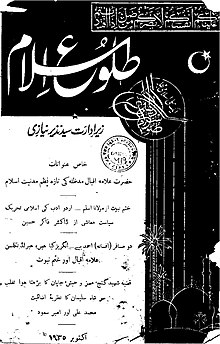
Sir Syed Ahmad KhanKCSI was an Indian Muslim reformer, philosopher, and educationist in nineteenth-century British India. Though initially espousing Hindu–Muslim unity, he became the pioneer of Muslim nationalism in India and is widely credited as the father of the two-nation theory, which formed the basis of the Pakistan movement. Born into a family with strong debts to the Mughal court, Ahmad studied the Quran and Science within the court. He was awarded an honorary LLD from the University of Edinburgh in 1889.

Israr Ahmad was a Pakistani Islamic theologian, philosopher, and Islamic scholar who was followed particularly in South Asia as well as by South Asian Muslims in the Middle East, Western Europe, and North America.

Hussain Ahmad Madani was an Indian Islamic scholar, serving as the principal of Darul Uloom Deoband. He was among the first recipients of the civilian honour of Padma Bhushan in 1954.
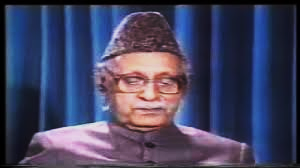
Ghulam Ahmad Parwez, widely known as Allama Parwez, was a pioneer of Quranic doctrine from pre-Independence India and later Pakistan. He attempted to rationally interpret Quranic themes, by challenging the established Sunni doctrine. Many conservative Islamic scholars criticized Parwez throughout his active years, although Parwez was well regarded among the educated demographic. Nadeem F. Paracha has called Parwez's Islam: A Challenge to Religion one of the most influential books in the history of Pakistan.
Tolu-e-Islam, also known as Bazm-e-Tolu-e-Islam, is an organization which focuses on understanding the Quran via logic, empiricism, and the appropriate application of the rules of Classical Arabic. The words Tolu-e-Islam, meaning "dawn" or "resurgence" of Islam, were taken from "Tulu'i Islam", the title of a poem by the philosopher and poet Muhammad Iqbal.

Aslam Jairajpuri(Urdu:علامہ اسلم جیراجپوری) was a scholar of Qur'an, Hadith, and Islamic history who is best known for his books Talimat-e-Qur'an and "History of Qur'an. He was Distinguished Professor of Arabic and Persian at Aligarh Muslim University and Jamia Millia Islamia. He was born on 27 January 1882 in Jairajpur, Azamgarh, in Uttar Pradesh, India, and died on 28 December 1955 in Delhi.
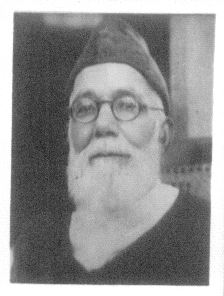
Chaudhry Niaz Ali Khan was a civil engineer, agriculturalist, and philanthropist who founded "Dar ul Islam Movement" and "Dar ul Islam Trust" in South Asia and "Dar ul Islam Trust" Institutes in Pathankot and Jauharabad. Besides a philanthropist, Niaz was also a civil servant, and a landowner. He was the member of All-India Muslim League and a participant of the Pakistan Movement with the ultimate aim of creating the Muslim-majority areas of British India.
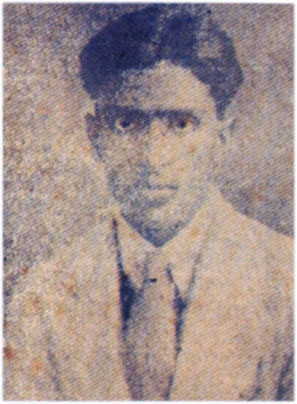
Syed Nazeer Niazi was an eminent Muslim scholar, professor and journalist. He was one of the leading activists of the Pakistan movement. He was James Boswell of Allama Iqbal. His biography of Iqbal, Iqbal kay Hazoor, and Maktoobat-e-Iqbal Banaam Nazir Niazi are basic sources for the study of Iqbal. During the last two years of Iqbal's life, he regularly visited him and recorded his conversation in his book "Iqbal Kai Hazoor". He completed this conversation in three volumes, but unfortunately the last two volumes were destroyed. Only first volume was published.

Ahmadiyya, officially the Ahmadiyya Muslim Community or the Ahmadiyya Muslim Jama'at, is an Islamic revival or messianic movement originating in Punjab, British India, in the late 19th century. It was founded by Mirza Ghulam Ahmad (1835–1908), who claimed to have been divinely appointed as both the Promised Mahdi and Messiah expected by Muslims to appear towards the end times and bring about, by peaceful means, the final triumph of Islam; as well as to embody, in this capacity, the expected eschatological figure of other major religious traditions. Adherents of the Ahmadiyya—a term adopted expressly in reference to Muhammad's alternative name Aḥmad—are known as Ahmadi Muslims or simply Ahmadis.
Lieutenant Colonel Qazi Altaf Hussain (1920–1999) served in the British Indian Army later taking up a place in the Army of Pakistan. He advanced to various positions of leadership during his military career, serving as lieutenant colonel of the 11 Frontier Force Regiment, commandant of the Zhob Militia in Quetta, Pakistan, and commander of a regiment in the Indo-Pakistani War of 1965. He was forced to retire as a lieutenant colonel, instead of advancing to general, as a result of his short-tempered, frank and outspoken nature.

Sir Muhammad Iqbal was a South Asian Muslim writer, philosopher, scholar and politician, whose poetry in the Urdu language is considered among the greatest of the twentieth century, and whose vision of a cultural and political ideal for the Muslims of British-ruled India was to animate the impulse for Pakistan. He is commonly referred to by the honorific Allama.
Raja Hassan Akhtar; was a political worker in the Pakistan Muslim League prior to the independence of Pakistan in 1947. After independence, he was a Member Pakistan National Assembly (MNA), President, West Pakistan Muslim League, Vice President, All Pakistan Muslim League, and Tehrik–e–Pakistan Gold Medalist

Non-denominational Muslims are Muslims who do not belong to, do not self-identify with, or cannot be readily classified under one of the identifiable Islamic schools and branches.
Ghulam Rasool Mehr was a Pakistani Muslim scholar and political activist born in Phoolpur, a village in the district of Jalandhar, British India.
Majlis-e-Tahaffuz-e-Khatme Nabuwwat is the programmatic name of a Pakistani Barelvi organization and Islamic religious movement in Pakistan aiming to protect the belief in the finality of prophethood of Muhammad based on their concept of Khatam an-Nabiyyin. It was founded by Mohammad Abdul Ghafoor Hazarvi in 1950 with Zafar Ali Khan, Abdul Hamid Qadri Badayuni, Khwaja Qamar ul Din Sialvi, Syed Faiz-ul Hassan Shah, Ahmad Saeed Kazmi, Abdul Sattar Khan Niazi, Pir of Manki Sharif Amin ul-Hasanat, Muhammad Karam Shah al-Azhari, Sardar Ahmad Qadri and Muhammad Hussain Naeemi. Later on the prominent Barelvi leaders Shah Ahmad Noorani, Shaikh ul Quran Allama Ghulam Ali Okarvi, Pir Muhammad Alauddin Siddiqui, Muhammad Shafee Okarvi, Syed Shujaat Ali Qadri, Iftikharul Hasan Shah and Khalid Hasan Shah also joined them to oppose the Ahmadiyya Movement.
Husamul Haramain or Husam al Harmain 1906, is a treatise written by Ahmad Raza Khan which declared the founders of the Deobandi, Ahle Hadith and Ahmadiyya movements as heretics.
Jamaat Ali Shah (1834–1951) was a Sufi of the Naqshbandi order and an author. He was President of All India Sunni Conference and the leader of the Shaheed Ganj Mosque. He was an influential leader of the Pakistan Movement.
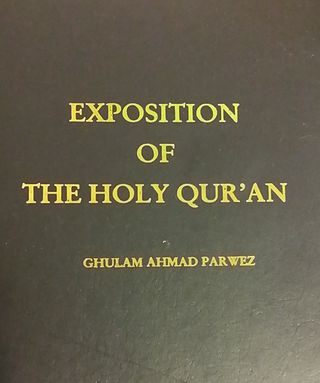
Ghulam Ahmed Perwez's ideas focused on systematically interpreting Quranic themes, and Muhammad Iqbal’s writings in the light of Islamic Reform with an aim to reorganize society on a Quranic basis. According to Parwez, the original purpose of Islam, is to free humanity from the oppressive rule of man-made systems of control. These man-made systems include Theocracy and Secular Democracy, both of which, are in contradiction to Quranic principles. A Quranic model of government will give the final authority to God Himself. Such a government allows only those laws which are within the bounds of Quran, and actively promotes Quranic principles. He elaborated on the definition of many Quranic principles, such as that of Zakat, which he defined as universal welfare. He also emphasized the importance of unity for Muslims: "the Qur’an is naturally opposed to sectarianism in deen and factionalism in politics. Sects and factions breed strife and dissension in the Ummah. According to the Qur'an, sectarianism is a form of shirk."
